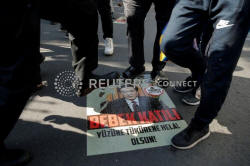Think-tank report on Uighur labor in China lists global
brands
 Send a link to a friend
Send a link to a friend
 [March 02, 2020] BEIJING
(Reuters) - Tens of thousands of ethnic Uighurs were moved to work in
conditions suggestive of "forced labor" in factories across China
supplying 83 global brands, an Australian think tank said in a report
released on Sunday. [March 02, 2020] BEIJING
(Reuters) - Tens of thousands of ethnic Uighurs were moved to work in
conditions suggestive of "forced labor" in factories across China
supplying 83 global brands, an Australian think tank said in a report
released on Sunday.
The Australian Strategic Policy Institute (ASPI) report, which cited
government documents and local media reports, identified a network of at
least 27 factories in nine Chinese provinces where more than 80,000
Uighurs from the western region of Xinjiang have been transferred.
"Under conditions that strongly suggest forced labor, Uighurs are
working in factories that are in the supply chains of at least 83
well-known global brands in the technology, clothing and automotive
sectors, including Apple, BMW, Gap, Huawei, Nike, Samsung, Sony and
Volkswagen," the think-tank said in the introduction to its report.
The ASPI report said the transfers of labor were part of a
state-sponsored program.

It says the workers "lead a harsh, segregated life", are forbidden to
practice religion, and are required to participate in mandarin language
classes.
It also says the Uighurs are tracked electronically and restricted from
returning to Xinjiang.
China's Foreign Ministry on Monday said reports the government had
violated the Uighurs' rights were untrue.
"This report is just following along with the U.S. anti-China forces
that try to smear China's anti-terrorism measures in Xinjiang,"
spokesman Zhao Lijian at a regular press briefing on Monday.
The United Nations estimates over a million Muslim Uighurs have been
detained in camps in Xinjiang over recent years as part of a
wide-reaching campaign by Chinese officials to stamp out terrorism.
The mass detentions have provoked a backlash from rights groups and
foreign governments, which say the arbitrary nature of the detentions
violates human rights.
China has denied the camps violate the rights of Uighurs and say they
are designed to stamp out terrorism and provide vocational skills.
"Those studying in vocational centers have all graduated and are
employed with the help of our government," said the Foreign Ministry's
Zhao, "They now live a happy life."
PUBLIC SUPPLIER LISTS
The 83 global brands mentioned in ASPI's report either work directly
with the factories or source materials from the factories, it said,
citing public supplier lists and the factories' own information.
[to top of second column] |

Ethnic Uighur demonstrators step on a poster with an image of
Chinese President Xi Jinping during a protest against China in front
of the Chinese Consulate in Istanbul, Turkey, October 1, 2019.
REUTERS/Huseyin Aldemir/File Photo

One of the factories, O-Film Technology Co Ltd, which has manufactured cameras
for Apple Inc's <AAPL.O> iPhones, received 700 Uighur laborers as part of the
program in 2017, a local media article cited by the report said.
Apple referred Reuters to an earlier statement that said "Apple is dedicated to
ensuring that everyone in our supply chain is treated with the dignity and
respect they deserve. We have not seen this report but we work closely with all
our suppliers to ensure our high standards are upheld."
Telecoms giant Huawei Technologies Co Ltd [HWT.UL] said it has read the report
and is looking into the matter.
"Huawei requires all our suppliers to comply with international labor standards
and applicable laws as a condition of doing business with us," a spokesman said.
The other companies mentioned in the introduction to ASPI's report - BMW <BMWG.DE>,
Gap Inc <GPS.N>, Nike Inc <NKE.N>, Samsung [SAGR.UL] and Sony Corp <6758.T> did
not respond to requests for comment on Monday.
O-Film Technology did not respond to a request for a comment either.
Volkswagen told Reuters in a statement that none of the listed companies is a
direct supplier. It said the company holds "direct authority" in all parts of
its business and "respects minorities, employee representation and social and
labor standards".

The report said a small number of the brands, including Abercrombie & Fitch Co [ANF.N],
advised vendors to terminate their relationships with these companies in 2020,
and others denied direct contractual relationships with the suppliers.
ASPI describes itself as an independent think-tank whose core aim is to provide
insight for the Australian government on matters of defense, security and
strategic policy.
(Reporting by Cate Cadell in Beijing, additional reporting by David Kirton in
Shenzhen; Editing by Simon Cameron-Moore and Emelia Sithole-Matarise)
[© 2020 Thomson Reuters. All rights
reserved.] Copyright 2020 Reuters. All rights reserved. This material may not be published,
broadcast, rewritten or redistributed.
Thompson Reuters is solely responsible for this content. |